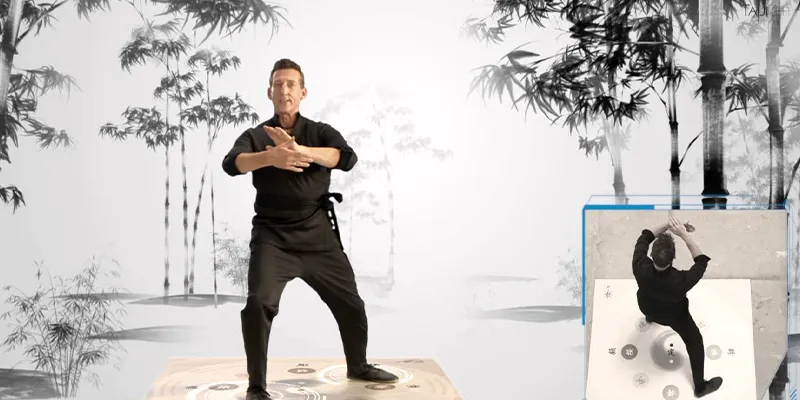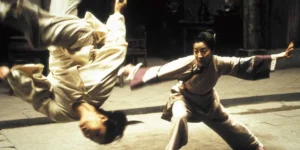Best online Tai Chi classes have no standard. Tai Chi is a traditional Chinese martial art widely used for fitness, health, and treatment. In recent years, with people’s increasing focus on health, more and more people have taken up Tai Chi. Many begin their practice online, as online classes are free. So, what are the best online Tai Chi classes?

Online Tai Chi classes break time and space, providing learning opportunities for anyone, anywhere, at any time. Through video instruction, detailed movement breakdowns, and theoretical explanations, they offer fitness and rehabilitation guidance, ultimately helping practitioners achieve a healthier lifestyle.
Best Online Tai Chi Class Advantages
Accessibility and Freedom:
Online Tai Chi classes break down the area barrier, allowing practitioners to practice wherever they are. Whether living in rural areas without local instructors, experiencing limited access to specialized styles like Chen, Yang, or Wu styles, or even living in countries where Tai Chi is less well-established, students can connect with top Tai Chi masters and various styles from around the world.
Now, just searching for “best online Tai Chi classes” allows you to transform your home, workplace, or even any quiet space into a practice space.
Flexibility and Convenience:
Online Tai Chi classes perfectly fit into modern lifestyles. They free students from the constraints of class schedules and commutes. They can practice early in the morning, late at night, during lunch breaks, or whenever and wherever feels right. Tai Chi’s flexibility allows entry into daily life, fostering long-term habits.
Furthermore, best online tai chi classes allow for the ability to pause, rewind, and replay complex movements or instructions at any time. Whether practicing for an hour or less, Tai Chi can maximize your health and wellness.

Personalized Learning Pacing:
Unlike group classes, which involve a steady pace of learning, online learners can repeatedly watch high-quality, multi-angle video demonstrations to meticulously analyze difficult movements. Complex Tai Chi movements can be broken down frame by frame, and students can review theoretical concepts at their leisure. This self-paced learning pace accommodates varying learning speeds and avoids frustration.
Safe, Low-Impact Exercise:
Those with chronic conditions, those recovering from illness, or those with balance issues can safely learn and practice the fundamentals without worrying about falling in an unfamiliar studio or losing the pace of the group. The best online Tai Chi still retains its low-impact benefits, allowing students to rest or adjust movements immediately based on their body’s feedback.
Comprehensive Learning Resources:
The best online Tai Chi classes typically offer richer, more structured learning materials than in-person courses. In addition to continuous video lessons, students often have access to additional resources, such as detailed PDF guides on posture alignment and principles, workshops focusing on specific areas, theory lectures, dedicated Q&A sessions, and sometimes even supportive community forums. This diverse system helps you gain a more comprehensive understanding of Tai Chi, connecting the movements with historical context and meditation, fostering a deeper, more integrated practice.
Saving Cost:
Learning Tai Chi online often offers cost savings compared to in-person classes. Students can avoid commuting costs and studio fees or expensive venue management and registration fees. Many of the best online Tai Chi classes offer exceptional value with a single purchase. This cost-saving advantage makes Tai Chi accessible to more people.
How To Choose Your Best Online Tai Chi Classes

- Define Your Personal Goals and Needs
Begin by honestly assessing why you want to learn Tai Chi and what you need from a class. Are you seeking stress relief, rehabilitation from an injury, improved balance, or martial arts depth? Your goal dictates the style, such as gentle Yang style for seniors or dynamic Chen style for fitness, intensity, and instructor expertise required. Consider practical constraints: time availability, physical limitations, budget, and whether you prefer live interaction or self-paced learning. Without this clarity, you may choose a mismatched program.
- Verify Tai Chi Instructor Certification
The instructor’s expertise is paramount. Look for teachers with verifiable lineage (e.g., certified by recognized bodies like the International Tai Chi Federation) and 10+ years of teaching experience. Check their background: Do they specialize in your area of interest? Review their professional presence—websites, published articles, or interviews—to assess depth of knowledge. Avoid instructors lacking transparent credentials. Platforms like Tai Chi Online or YMAA often list master bios; cross-reference with independent reviews or academic databases like PubMed if they cite research-backed methods.
- Evaluate Class Structure and Learning Resources
A high-quality course offers a logical progression: foundational stance work → single movements → short sequences → full forms. Scrutinize the syllabus: Does it include theory alongside physical practice? Check for supplementary materials like downloadable tai chi move PDFs, multi-angle videos, and modifier options for injuries. Avoid fragmented “tips” videos—opt for programs with structured modules. If learning a specific form, confirm the curriculum covers it comprehensively.
- Assess Production Quality and Teaching Clarity
Preview free content: Videos should be HD quality with clear lateral/frontal views—never shot in dim light or obstructed angles. Audio must be crisp to hear breathwork cues. The instructor should demonstrate movements facing the camera while offering concise verbal cues. Avoid overly verbose or silent demonstrations. Look for real-time corrections to preempt bad habits. Poor production can derail even expert teaching.
- Prioritize Safety and Adaptability
Tai Chi is low-impact but requires precise alignment to avoid strain. Ensure the program emphasizes safety protocols: warm-ups/cool-downs, joint-friendly transitions, and clear contraindications. Look for modifications for different fitness levels and medical disclaimers advising consultation with doctors. Courses designed for clinical populations should cite collaborations with healthcare professionals.
- Leverage Trials and Feedback
The best online tai chi classes offer free intro lessons or 7-day trials—use these to gauge teaching style compatibility. Simultaneously, analyze verified reviews on third-party sites (Trustpilot, Reddit) for recurring praise/complaints. Watch for patterns: “Great for beginners” or “Lacks detail on advanced techniques.” Join Tai Chi forums to ask about specific instructors. If a course lacks trial access or has consistently poor feedback, proceed cautiously.
- Confirm Support and Interactivity Options
Choose programs with direct support channels: live Q&A sessions, instructor feedback on uploaded videos, or moderated discussion boards. Courses offering community access foster motivation through peer accountability. If opting for purely prerecorded content, ensure meticulous self-assessment tools are included. Without feedback mechanisms, errors in posture or breathing may go uncorrected.
- Compare Value Holistically
A 200-course bundle with lifetime access, weekly live coaching, and progress tracking may value a 20 Udemy bundle lacking support. Calculate cost per instructional hour and resource depth—avoid overpaying for superficial content. Payment transparency and money-back guarantees are green flags.
Best Online Tai Chi Classes Recommended

- Tai Chi Foundation (TCF) Online (https://taichifoundation.org/online-learning/)
- Why it’s Top-Tier: Non-profit organization with deep roots in Cheng Man-ch’ing lineage Yang style. Taught by highly experienced, certified instructors (many decades of practice).
- Offerings: Live interactive Zoom classes (beginner to advanced), workshops, multi-week courses, and an extensive on-demand video library for members.
- Best For: Serious learners seeking authentic, traditional Yang style Tai Chi with structured progression and community support. Membership provides excellent value.
- Cost: Membership fee (around $100/year) + individual class/course fees (reasonable). Some free introductory content.
- TaijiFit / Flow with David-Dorian Ross (https://taichiforhealthinstitute.org/ & https://www.taoistwellness.online/)
- Why it’s Top-Tier: Dr. Ross is a globally renowned Tai Chi master and educator, specializing in making Tai Chi accessible, safe, and health-focused. Strong emphasis on therapeutic applications.
- Offerings: Extensive online courses through his Taoist Wellness site (structured programs like “21-Day Challenge”), instructor training (Tai Chi for Health Institute), and a vast library of instructional DVDs/streaming. Also offers TaijiFit – a more modern, movement-based adaptation.
- Best For: Beginners, seniors, those with health concerns (arthritis, balance issues), fitness enthusiasts (TaijiFit), and aspiring instructors. Excellent, clear instruction.
- Cost: Individual course purchases, subscriptions, or instructor certification programs. Some free resources/youtube.
- Yang Chengfu Tai Chi Chuan Center (Global Network – Find Local Center Online Offerings)
- Why it’s Top-Tier: Represents the official lineage of Yang Family Tai Chi (Grandmaster Yang Jun). Offers unparalleled authenticity in traditional Yang style.
- Offerings: Many affiliated centers worldwide offer live online classes via Zoom. Also provides access to official instructional videos and resources from the headquarters. Look for centers like Martial Arts America (MAA) or Yang’s Martial Arts Association (YMAA) which often have robust online programs.
- Best For: Students dedicated to learning precise, traditional Yang family Tai Chi forms, push hands, and theory directly from the source lineage.
- Cost: Varies by center/teacher, typically per class or monthly fee for live online sessions.
- Chen Xiaoxing Taijiquan Academy Online (https://chenxiaoxing.com/online-training/)
- Why it’s Top-Tier: Direct access to training from Chenjiagou (the birthplace of Tai Chi) under Grandmaster Chen Xiaoxing. Premier source for authentic Chen style.
- Offerings: Structured online courses with progressive levels (Laojia, Xinjia, weapons), detailed instructional videos, supplementary materials, and sometimes live Q&A sessions.
- Best For: Intermediate to advanced practitioners, or very dedicated beginners, committed to learning rigorous, traditional Chen style Tai Chi with silk reeling, fajing, and forms.
- Cost: Course purchase fees (can be an investment, but high quality).
- Udemy / Coursera (Specific Instructor Courses – e.g., David-Dorian Ross, Eric Sbarge)
- Why it’s Top-Tier: Platform hosts highly-rated, affordable, structured courses from excellent instructors. Great for self-paced learning.
- Top Picks:
- David-Dorian Ross: “Tai Chi Five Animal Frolics Workout” (Udemy), “Tai Chi & Qi Gong: Energy Concepts for Health” (Coursera).
- Eric Sbarge (Flowing Zen Tai Chi): “Tai Chi for Beginners” (Udemy) – Clear, practical instruction focusing on Sun style fundamentals.
- Best For: Budget-conscious beginners or those wanting specific short courses. Self-paced, learn anytime. Good supplement to live classes.
- Cost: Udemy/Coursera often have sales (courses typically 10−10−30). Eric Sbarge also has his own subscription site (https://flowingzen.com/).



